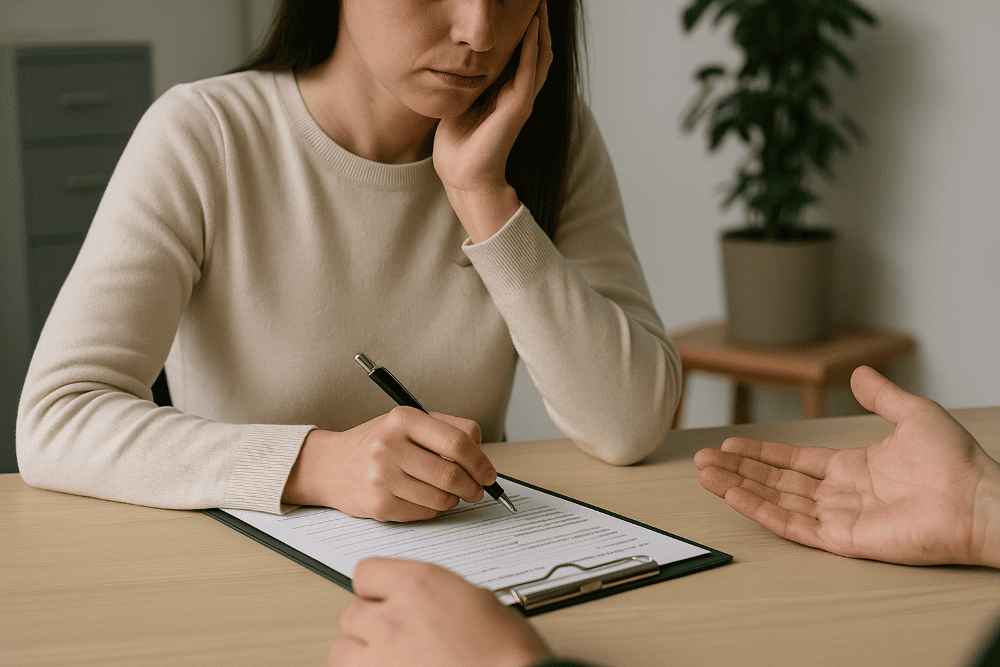Filing a complaint about domestic violence is a delicate step that can raise many questions and concerns. When you are a victim of domestic violence, you can seek the protection of the law and take legal action to ensure your safety. In Quebec, several legal mechanisms are in place to support victims of domestic violence and enable them to file a complaint in a structured and confidential setting. Our domestic violence lawyers can explain them to you.
What is domestic violence?
Violence is any behavior used to dominate or control another person, whether through fear, intimidation, humiliation or coercion. It can take many forms: physical violence (blows, injuries), psychological violence (threats, insults, control), sexual violence (non-consensual intercourse), economic violence (financial deprivation) or social violence (isolation). The law recognizes all these forms of domestic violence and allows victims to file a complaint of conjugal violence, regardless of the nature of the abuse suffered.
Why file a complaint for domestic violence?
Filing a complaint allows you to denounce abusive actions or behaviors and obtain legal protection. This can lead to a police investigation, the implementation of immediate protective measures and, in some cases, criminal prosecution. This approach is also a means of documenting the facts, which can prove decisive in civil or family proceedings, particularly in cases of separation or child custody.
How do I file a complaint for domestic violence in Quebec?
Any victim of domestic violence can file a complaint. Here are the usual steps:
1. Contact the police
The victim can go directly to a police department, or call 911 in an emergency. An officer will take the complaint and open a criminal file.
No tangible evidence is required to file a complaint. The victim’s testimony is sufficient to start an investigation. However, it is advisable to keep any evidence that may support the complaint (messages, photos, medical certificates).
2. Filing a formal complaint
Following the initial statement, the police may take a more detailed statement. This statement will form the basis of the investigation. In some cases, the police may immediately arrest the violent partner if the victim’s safety is threatened.
3. Protective measures and follow-up
In parallel, protective measures can be requested:
- Peace bond.
- Restraining order.
- Temporary eviction from the home.
The courts may also impose conditions on the accused spouse to ensure the safety of the victim and, where applicable, the children.
What are the time limits for filing a complaint for domestic violence?
Some victims are reluctant to file a complaint for fear of reprisals, or out of attachment to their partner. It’s possible to ask for help and consult a civil or criminal lawyer without immediately pressing charges. Support services and shelters can also be called upon for temporary accommodation and protection.
It’s important to remember that a complaint can be filed even after a certain delay. However, when it comes to violence, the quicker the procedure, the easier it is to protect the victim and preserve evidence.
What happens after a complaint is filed?
Filing a complaint of domestic violence triggers a legal process that is governed by Quebec law. This process may seem complex, but it follows clear steps designed to protect the victim and ensure that the case is handled fairly in a situation of domestic violence.
1. Arrest and filing of charges
When police receive a complaint of domestic violence, they immediately assess the situation. If the victim’s safety is in danger, or if there is evidence to justify rapid intervention, the alleged aggressor may be arrested on the spot.
After arrest, the file is forwarded to the Director of Criminal and Penal Prosecutions (DPCP). It is the prosecutor who determines whether charges will be filed. The decision whether or not to prosecute never rests with the victim: it belongs exclusively to the DPCP.
2. Appearance
If charges are laid, the accused spouse is summoned to appear in court. At this hearing, he or she is informed of the criminal charges against him or her. Control measures may be imposed at this stage:
- Prohibition of contact with the victim.
- A ban on visiting the family home or workplace.
- Conditional release or preventive detention, depending on the seriousness of the offence.
3. Legal follow-up
After the court appearance, the case takes its course. The parties involved may be called upon to participate at various stages:
- Release hearing: in more serious cases, the court determines whether the accused can be released pending trial.
- Pre-trial conferences: to discuss evidence and plan further proceedings.
- Trial: if the case is not resolved by a guilty plea, it can proceed to trial.
The trial is the stage at which the court examines the facts, hears witnesses – including the victim, if she agrees to testify – and reaches a verdict. The victim can be assisted throughout this process by a lawyer and by professionals specialized in domestic violence.
4. Decision and sanctions
If the accused is found guilty, the court imposes a sentence that may range from:
- Probation with or without therapeutic follow-up.
- Community service.
- Incarceration for the most serious offences.
The length and nature of penalties depend on a number of factors, including the seriousness of the offence, the criminal record and the impact on the victim, in accordance with the Criminal Code.
Victims’ rights throughout the process
Victims of domestic violence have the right to be informed and protected at every stage of the legal process. They can be assisted by :
- Organizations specializing in domestic violence.
- The Centre d’aide aux victimes d’actes criminels (CAVAC).
- A personal injury lawyer who can also assess the possibility of obtaining civil compensation.
The victim’s role in the legal process is central, but they are not responsible for court decisions. This ensures that no pressure is put on the victim to withdraw or abandon the proceedings.
Can I withdraw my complaint afterwards?
Some victims may wish to withdraw their complaint after it has been filed. In Quebec, once the police have forwarded the file to the DPCP, the decision to prosecute rests with the prosecutors and not with the victim. This is to avoid pressure or threats that could lead a victim to retract the complaint, which is common in cases of violence. However, it is possible to inform the authorities of a change of position. The DPCP will then assess whether or not to maintain the proceedings.
Can I file a complaint for domestic violence without proof?
You don’t need any material evidence to file a domestic violence complaint. The victim’s testimony is sufficient to trigger an investigation. However, if elements such as messages, photos or a medical certificate exist, they can support the complaint. The absence of tangible evidence should never discourage a victim from reporting the situation.
Assistance from a personal injury lawyer
Making a complaint about domestic violence can have complex legal consequences. In addition to the criminal aspect, the victim may suffer physical, psychological and economic after-effects. A personal injury lawyer can :
- Evaluate the physical and moral damage suffered.
- Suggest civil remedies to obtain compensation.
- Offer personalized support.
In Quebec, several remedies can be considered, including a claim to IVAC (Indemnisation des victimes d’actes criminels) to cover certain damages.
Protecting yourself and asking for help: a step towards safety
Making a complaint about domestic violence is not a trivial matter. It’s often an act of courage that helps break the cycle of violence. Every victim has the right to be heard, protected and supported. It is possible to consult a lawyer from the very first questions, even before filing a complaint, for advice and support in a strictly confidential setting.
Medlégal offers professional assistance to victims of domestic violence. Our personal injury and emotional injury lawyers have the expertise to defend your rights and guide you every step of the way. We invite you to contact us for an initial consultation to assess your situation and consider the appropriate legal steps.
Legal sources:







